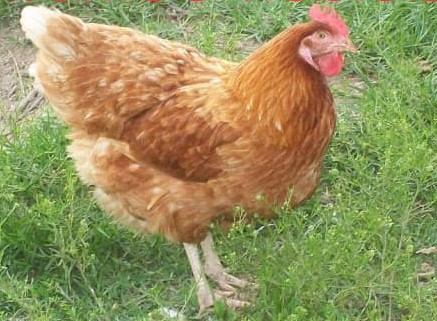Are you thinking about raising a Golden Comet chicken? Golden Comets are fantastic egg-layers, which makes this the primary reason many people raise them. While you can eat their meat, flock owners generally don’t choose them as a meat breed because they are small.
Here’s everything you should know about this hybrid chicken breed before you get started.
Purpose for Raising Golden Comet Chicken
Golden Comet chickens are egg-laying powerhouses, making them an excellent choice for small flock owners who want eggs as often as possible or commercial enterprises that want to maximize egg production as early as possible. To a lesser extent, Golden Comets are also popular choices as pets. As we’ll discuss in more detail, they are generally calm and friendly birds.
This makes them relatively safe around other pets or small children, as well as good companions for other relaxed breeds.
Egg Production
They are prolific layers, laying up to 335 eggs per year. On average, a Golden Comet chicken will lay six eggs per week. Hens will continue laying during the cold and winter months.
This makes them a reliable, consistent layer and good to add with a flock who only produce in the warmer months. They are one of the best best egg laying chickens for backyard farms and homesteads.
Egg Size
Golden Comets produce medium-to-large sized eggs. This is an industrial measurement, not an opinion statement on their general size. Medium eggs are about 1.75 ounces while large eggs are about two ounces.
As mentioned above, Golden Comets usually start with small eggs for a short time as their bodies finish growing, then start producing their regular, full-size eggs. Medium and large eggs are among the most popular sizes, which is another reason people pick this breed.
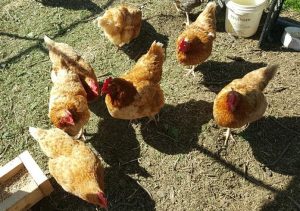
Egg Color
Golden Comets lay brown eggs. Shell color has no meaningful impact on nutritional value or flavor, although some people may prefer brown eggs for aesthetic reasons.
Laying Age
Golden Comets usually start laying eggs at 16 weeks old, which is on the low end for egg-producing chickens. The most comparable breed is the White Leghorn, which also starts laying at 16 – 17 weeks.
Most other chickens take at least 20 weeks to begin laying eggs. One, the Maran, can take as many as 30 weeks.
Note that the eggs of young Golden Comets will typically start small. They don’t produce full-size eggs until they’ve had more time to grow, but within a few more weeks, they should be producing full-size eggs quite readily.
Do Golden Comets Lay All Year?
Yes. More specifically, they see the maximum amount of egg production for 18-24 months after they start producing eggs, which is usually about four months after birth. Since they lay eggs in all seasons, you can start raising them anytime and get a predictable supply of about five to six eggs per week from each hen.
How Long Do They Lay Eggs For?
Most Golden Comets are productive for about three years after they start laying eggs. You can expect 300 – 330 eggs per year for approximately the first two years, after which they tend to start slowing down. Notably, Golden Comets are such prolific egg-makers that their slower rate, about three to four eggs per week, is comparable to the regular rate of many other breeds.
This means that they tend to produce eggs throughout their lives. Although the quality may start to deteriorate when they’re modestly into their third laying season.
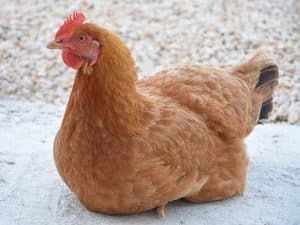
Meat Production
Golden Comets are not a good choice for producing chicken meat because they are smaller birds. Older members of this breed have the most meat, but even then, they rarely exceed five or six pounds. That’s a little low for a meat chicken, so you won’t see much actual meat on them.
Further, that’s at the time in their lives when they’ll have the most meat. Regular meat chickens are usually processed after just one to two months of growth following an optimal feeding pattern. That’s a lot faster and produces far more meat.
If you don’t want to waste any more than necessary, you can cull and eat older Golden Comets and non-productive layers. Eating two of these chickens at once might be a better way to get a good amount of meat on the table.
Ultimately, though, that’s only practical at the end of their lives and doesn’t serve as a good choice for regular meat.
Hardiness
Golden Comets are reasonably hardy hens. As a cross between Rhode Island Red and White Rock hens, they’ve received many of the best qualities of both breeds.
Notably, the Rhode Island Red ancestry gives them generally good tolerance to both cold and heat. This does not mean that Golden Comets can easily survive without at least some temperature controls, especially cold weather. However, they’re hardier than other breeds and tend to maintain their productivity with only a minor amount of care. Another similar hybrid cross are Gold Star chickens.
Provide them with a draft-free shelter to keep them out of the elements. It will need to be well-ventilated and kept clean. They should be able to stay dry to prevent frostbite. In addition, they are smaller birds and heat tolerant as well. They will need access to fresh and clean water daily as well as areas with ample shade.
Temperament/Personality
Golden Comets have gentle and friendly personalities making them one of the best chicken breeds to raise. People often refer to them with terms like laid-back, sweet, and intelligent. Most Golden Comets are extraordinarily docile, actively avoiding confrontations with other breeds.
They do well among other relaxed breeds, such as Buff Orpingtons and Cochin chickens.
However, they don’t do well with particularly active or assertive birds, who may end up trying to bully the Golden Comets. This can stress them out and actively reduce egg production.
Outside of their gentleness, this breed is modestly curious. They like investigating new things, so occasionally adding toys or other things to do can help them remain happy.
Like all chickens, though, Golden Comets need a certain amount of space. Each should have about four square feet in a coop, as well as eight to ten inches in the roosting area, and a 12×12 nesting box. One nesting box is enough for about three hens. Learn how much space do chickens need.
This isn’t a problem if you’re only raising one Golden Comet chicken, but make sure to measure the space they have if you’re raising two or more. If they’re packed too tightly, they may start developing antisocial behaviors or, worse, get dirty and sick. Give the chickens in your flock enough space, and the Golden Comet chicken breed will be famously mild.
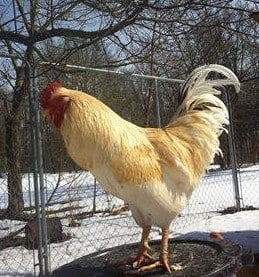
Broodiness
If you are hoping to hatch Golden Comet chicks, the Golden Comet hens rarely go broody. They won’t sit on eggs and raise them into chicks. If you want to hatch chicks, you’ll need to use a chicken incubator.
Broody hens typically stop laying eggs, which defeats the purpose of raising this breed, so the fact that Golden Comets rarely turn out this way makes them ideal to raise for eggs.
However, while broodiness is rare, it’s not impossible. In most cases, if you don’t want chicks, you can redirect the hen by blocking off the nesting box and helping them socialize with others. Reducing their body temperature a little can also help break them out of broodiness.
Golden Comet Rooster
Before taking on a rooster, it’s important to learn their breed’s temperament. Golden Comet roosters are not mean. They are generally relaxed, much like the hens. Although they may be a little more proactive and persistent in pursuing forage and otherwise finding food.
Overall, they aren’t aggressive and won’t fight to rank in the pecking order.
Are Golden Comets Beginner Friendly?
Yes, they are an excellent choice for beginning chicken keepers and a great addition to a backyard chicken flock.
The first and most important reason for this is their relaxed personalities. Golden Comets are famously gentle birds, friendly around both adults and children from shortly after hatching. They’re also quite sociable, often preferring to hang out with humans instead of other birds.
Golden Comets rarely fight or try to scratch, and they’re generally content and calm even if you need to pick them up and move them around. In short, this makes them one of the friendliest breeds on the market.
Second, Golden Comets are reasonably hardy. That gives more leeway for making mistakes with them, which is good for beginners who simply won’t be as familiar with the needs of chickens throughout their life cycles.
Finally, as egg-laying dynamos, Golden Comets produce enough eggs to help owners feel like they’re being successful raising them.
However, if you want a dual purpose bird, this is not the best choice. Also, they are a sub-par choice for breeding. Even with a Golden Comet rooster, they don’t naturally breed true because they’re a hybrid of other breeds,. It’s hard to create your own flock of Golden Comets without buying them from an experienced breeder.
Breeding challenges aren’t a problem for most owners, but it does mean you can’t expect to get a wholly independent flock.
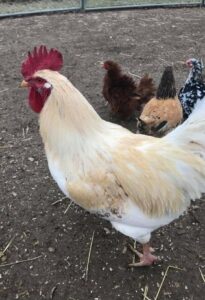
Appearance
Here’s what you should know about the appearances of Golden Comet roosters and hens.
Color
Golden Comets are sex-linked chickens, which means their gender always determines their color.
Females are always a reddish color. Female Golden Comets tend to start life with a bronze hue before settling into a brownish-red while males start slightly yellow before becoming white in their later years.
Golden Comet roosters are always white. They may have red shoulder feathers. They resemble ISA Brown chickens as well as the Cinnamon Queen chicken.
Roosters and hens have yellow legs. Their eye color is yellowish orange. Their beak color is brownish and yellowish.
Single Comb
This breed has a relatively large comb, and this part of their body is slightly more vulnerable to frostbite due to being located further away from most of their body heat. This isn’t a major issue in a living situation with proper shelter, but it’s worth being aware of if you plan to let them roam around a lot.
Size
While most people consider the Golden Comet a standard-sized bird, it’s more accurate to say that they’re a little on the small side for that. They’re not truly small birds, but they’re definitely on the smaller end for regular birds.
As mentioned above, a Golden Comet chicken won’t develop much meat on their bodies even if you raise them for years. The hens, in particular, invest most of their energy into egg-laying and simply don’t have the biological need to develop more meat.
Weight for Hen and Rooster
Golden Comet hens tend to weigh around 4 – 5 pounds once they reach adulthood. This may increase slightly towards the end of their lives as they spend less energy producing eggs but don’t expect any huge changes in their body weight.
Roosters weigh about six pounds when fully grown, although some may grow as heavy as eight pounds. This isn’t weighty enough to be a true meat bird, though.
Sex Link Chickens
Sex link chickens requires two parents from separate breeds. In this case, the Rhode Island Reds and the White Rocks. Other examples are the Welsummer and Barred Rock chickens.
Chick sexing is easy because Golden Comets are sex-linked, and you can tell their gender as soon as they’re hatched. Females are easily the more popular option because they’re the ones that produce eggs, so most hatcheries remove males before taking pictures.
Most breeders don’t consider Golden Comet roosters to be particularly valuable because they don’t breed true. Two Golden Comets mating produces a ‘mutt’ chicken instead of another Golden Comet, so it can be hard to get a hold of roosters unless you talk to a breeder and specifically ask them to separate the males for you.
How Noisy Are Golden Comets?
Golden Comets are not particularly noisy. Most of them only make noise for their eggs or alarm calls. They may also talk quietly to each other, but this is rarely loud enough to be bothersome.
This makes a Golden Comet chicken a relatively popular choice in cities and in neighborhoods where noise levels could be problematic.
They are quiet enough that any genuine noise from them could be a sign that something is wrong. Check on them if they’re being especially loud.
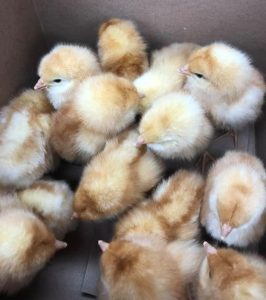
Golden Comet Chicks
Golden Comets are available as both baby chicks and pullets. Many people enjoy raising them directly from birth to form a closer bond with them. Breeders also raise them for four months and sell those that are just about ready to start laying eggs.
Getting pullets is a good choice if you want to minimize the amount of time before you can start getting eggs, although they will cost a little more than chicks.
Breed Info/Profile
Technically, Golden Comet chickens don’t qualify as a breed. This is because they’re a hybrid and don’t breed true with others of their own kind.
However, this particular hybrid does generally have predictable genetics and behaviors, so most people treat it similarly to a distinct breed despite the inability to form an ongoing bloodline.
Traditional Golden Comets are a cross between Rhode Island Red roosters and White Rock hens. Some breeders are working to adjust the breed itself by modifying the parents for specific traits that work better when combining with the partner.
Golden Comets are also close relatives of Isa Brown chickens, which share the Rhode Island Red heritage and are similarly docile birds with an extremely high egg-laying rate.
Some people also refer to this breed as the:
- Golden Buff
- Red Star
- Gold Sex-Link
Generally, most people accept Golden Comet as the primary name.
Class
As hybrids, Golden Comets don’t belong to any of the traditional chicken classes. At best, they’re a combination of the American and Mediterranean, but they’re crossbred specifically to take advantage of qualities from both classes.
Origin/History
Golden Comet chickens exist mainly thanks to the demands of the commercial egg market, which treats maximum egg production rates as one of the key factors when selecting breeds.
Although originally bred for commercial markets, its excellent mix of characteristics soon saw it transferring to smaller farms and even backyard ownership. Since then, the explosive popularity of this breed has helped it become one of the most-utilized kinds of chicken. In fact, it’s so popular that when people think about a brown chicken, they probably imagine this breed over any other.
Golden Comet Chicken Lifespan
Most Golden Comets live to a maximum of about five years, although specific genetic combinations may occasionally let them live as long as twelve years. That’s not common, but you do see the occasional outlier in the breed.
In some respects, this lifespan is an intentional part of the mixed breed chicken combination. Golden Comets are fast egg-producers, so they tend to burn out their organs from excessive use by the time they’re five years old. This can lead to problems like cancer, which is when people tend to put them down.
Notably, Golden Comets have much shorter lifespans than many egg-laying breeds that produce at a slower rate. This makes them a little tougher to raise as pets alongside children, despite their gentle personalities and general friendliness towards humans.
This is a noticeable departure from their parents, most of whom tend to live between ten and twelve years under optimal conditions.
If you’d rather raise a Golden Comet as a pet, you may be able to extend its lifespan by discouraging egg production. Many things can affect backyard egg production, and modifying a Golden Comet’s diet may result in a longer lifespan at the cost of reducing the number of eggs they lay.
Trying to modify the lifespans of pets can be challenging for beginners, though, so talk to a professional before attempting this.
Help them to live a good life by regularly cleaning, providing feed, fresh vegetables, and clean water, giving them the chance to free-range. They also enjoy dust baths.
Health Issues
Golden Comets are not prone to most problems throughout their first three years of life, other than potential environmental threats like lice or mites. Maintaining a clean and safe environment is usually enough to keep parasites away from them, especially if you have several hens that can help each other groom.
There are two particularly common issues that Golden Comets tend to experience as they age, though, and both have to do with egg production.
- Egg yolk peritonitis (less used term) or egg peritonitis
- Reproductive tumors
Egg peritonitis
This condition occurs when yolk from a developing egg remains within the coelom (a body cavity). This can inflame the tissue, lead to bacterial infections, and potentially kill the chicken if left untreated. Egg peritonitis may be caused by either the translocation of intestinal E. coli into the peritoneal cavity or by the movement of cloacal E. coli into the oviduct followed by ascension of these bacteria up the oviduct, through the infundibulum, and into the peritoneal cavity.
Keep their living area clean to protect them from harmful bacteria like E. coli (Escherichia coli). This condition is highly treatable with veterinary care, although it may be more expensive than getting a new chicken.
Reproductive tumors
Another issue is reproductive tumors, caused by overuse of the egg-production organs. This is a reason this breed tends to burn themselves out rather than living as long as their parents, and it’s usually very difficult to treat this successfully.
While some flock keepers supplement with artificial light in the winter months (when days are shorter) I personally think it’s important to allow my hens to take a natural break from laying eggs.
Providing a clean living environment and proper dietary support, including calcium, will help support laying hens. Check with a veterinarian with experience in avian or poultry medicine.
FAQs
1. What color eggs do Golden Comet chickens lay?
They lay brown eggs. Consistent layers, they are brown egg layers.
2. Can you eat Golden Comet chickens?
You can eat this breed. Their meat is tasty. However, chicken enthusiasts generally do not raise them primarily for meat. As far as chicken sizes go, they are on the smaller size. There are more economical chickens to raise for meat.
3. What is a Golden Comet chicken?
Hens are brown with some white feathers and roosters are mostly white. This is a hybrid breed of chicken. It’s a cross between Rhode Island Red and White Rocks. They are renowned for laying over 300 eggs per year. Eggs are brown. This breed also grows quickly.
4. Do Golden Comets lay in winter?
Yes, as long as they stay dry and are not stressed. They will lay reliably throughout the winter.
5. At what age do Golden Comet chickens lay eggs?
Hens start producing around four months old.
6. Are Golden Comet chickens friendly?
Yes, they are among the friendliest chicken breeds. Keeping them with other friendly breeds will foster harmony in the flock.
Raising Golden Comet Chicken
Now that you know more about Golden Comets, there’s one more thing to consider: housing.
Golden Comets do okay in confinement but will thrive when giving the opportunity to free range or forage in a chicken run. Sunlight, fresh air, the chance for exercise can help them prosper. Be sure to protect them from predators.
If you don’t have an area with forage year round, tossing out some cracked corn or other treats from time to time can help them with their natural instincts. Also, be sure to provide an area for dust baths.
These chickens are easy to raise but require proper care, including nutritious feed, clean water, and secure shelter with enough space.

